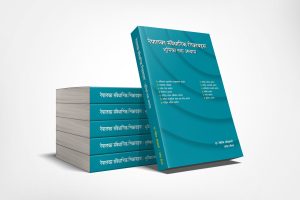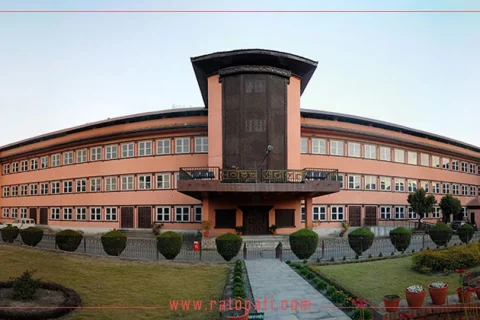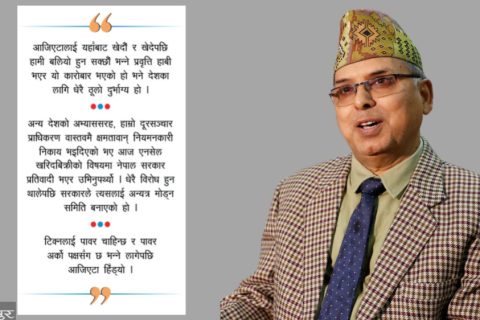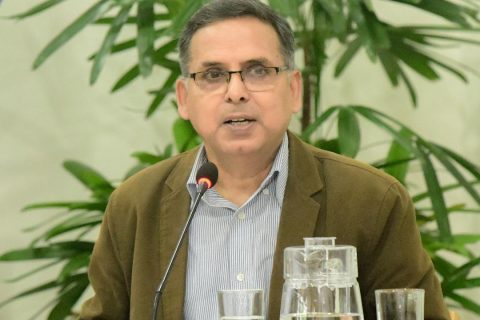This initiative was established because as two independent states, we realize that the relation between Nepal and India can and should be improved.
Currently, the relation between Nepal and India is not based on equal grounds; indeed, India has tried to view Nepal as a country it has the right to exercise its influence or even a “protective” responsibility over. This attitude is on the rise with recent economic and military advances. Over and over again, India has tried to assert its muscle on Nepal, meddling in its internal affairs and controlling its politics by manipulating the socio, political and economic hold it has in the country. India has consistently tried to exercise hegemony, which the Nepali people have tirelessly resisted, but have failed again and again. This has made the ancient land desperate. This is the sole reason why no native Nepalese would think that Indian activities or intentions are above board. However, if relations between the countries are to improve, it must be changed from an oppressor-oppressed one to one based on sovereign equality and principles of justice.
As a point of departure, India needs to understand Nepal as an independent and equal country, with its own national ego and plans and priorities, not a client country. Only then can the two countries begin working towards creating a stable, peaceful, and prosperous climate for each other in the bilateral relationship. This understanding must follow with certain other actions.
• Firstly, the Nepal-India international border, which India has forced Nepal to keep open since the last sixty-five years needs to be closed so that there is not a free and unrestricted movement across the border for either Nepali or Indians. Nepal wants this country to remain a home of Nepalese people. An open border is certainly a lasting threat.
• Secondly, as soon as the international border is closed, immigration services need to be established in place so that both the neighboring countries are better able to record and limit the flow of populations across the border.
• Thirdly, all immigrant Indians working in Nepal [who do not have citizenship certificates yet, should immediately attain time-bound work permits according to the law, so that the Government of Nepal is well-aware of the number of Indians working here and create adept policies to control that number as necessary. All Indians who do not register but serve as laborers, vendors, merchants, professionals, ghost professionals in major industries and trading groups need to return to India in a given period. There should be an end to unauthorized work to the Indians in Nepal under Indian pressure. Of course, the same policy should apply to the Nepalese working in India.
• Stemming from this point, fourthly, the Government of Nepal should encourage Nepalese working abroad (you may say the Nepalese economic refugees) in countries in the Arab world, Malaysia, and Singapore, among others, to return back to the country and fill these jobs, so that the priceless labor of Nepal is rightfully utilized within its own borders. As a good neighbor, India should help to rehabilitate them in their villages in different parts of Nepal who had to escape Nepal because of lack of opportunities due to competition of Indians within their own country.
• Fifth, the Indian government should offer citizenship certificates to all Nepalese who have been working and living in India the same way that the Nepali government was forced to do for Indian immigrants and working people in Nepal during the last few decades under Indian pressure. The natives of Nepal know how even the Constitution was sidelined to allow for the easy naturalization (claiming a mostly fake theory that they were Madhesis of Nepal who were denied citizenship). This is so that the rights and responsibilities of Nepalese in India are protected, and they are granted the same sort of privileges and attention as Indians working the same jobs.
• It is never possible to build mutual trust when many of the past bilateral treaties signed between these neighboring countries benefit one at the cost of other. Co-existence and mutual benefits are simple concepts. The treaties in the area of hydropower and water resources need to be revisited, rectified and implemented as soon as possible.
• Sixth, India should not try to involve with the people who already have Nepalese citizenship as people of India. This will never help create an integrated Nepali identity.
• Seventh, the Nepalese expect India to withdraw from Kalapani in western Nepal and return all encroached lands along the Nepal India international border.
These are not any new suggestions. The Harka Gurung Report on the Internal and International Migrations in Nepal (2040/1983) is still the best document to rely on to leave Nepal for Nepalese and improve the situation here. Nepal needs to prosper, and prosper with its own peculiarities as a people in terms of their age-old demography, socio-political institutions, the Himalayan identity, religion, culture and economic potentials. What comes as new development in recent years is the sharp increase in the effort to change Nepal in unnepali way, and interference in making or unmaking government, nomination of political appointees, transfer and promotion of senior employees, and even charging somebody with corruption. Along with the sufferings as above, this all means that Nepal cannot even function within a democracy and the system of the rule of law.
Currently, India pretends that Nepal is under its security umbrella. It is unwarranted. Nepal is certainly struggling with natural disasters, increase in poverty, environmental degradation, and the challenges of law and order. But they are our problems.. Our Himals, mountains, rivers and streams have been the gift of god. We did not create them to bring rains or create flood, or other natural calamities in the downstream countries. They should not be taken as a security issue for Indian interference. Nepal is a Nepalese responsibility.
By no means should India compromise its security; indeed, India should tighten its border security, build fences, mobilize army and police, and install facilities of whatever type that befits India’s security needs along its side of the international border or anywhere in its territory. It may also do many other things to assure its citizens are protected. Nepal should not want India relaxing its security for any purpose. What it does not mean is for India to meddle in Nepal’s internal affairs through actions in the government or attempts to influence Nepal’s constitutional functionaries, or act for Nepal in Nepal’s territory under its security perception. This will never be acceptable. The educated Nepalis will continue to take it as security threat for their country.
These are some of the few first steps that the two countries can agree upon so as to improve their relations with each other.







